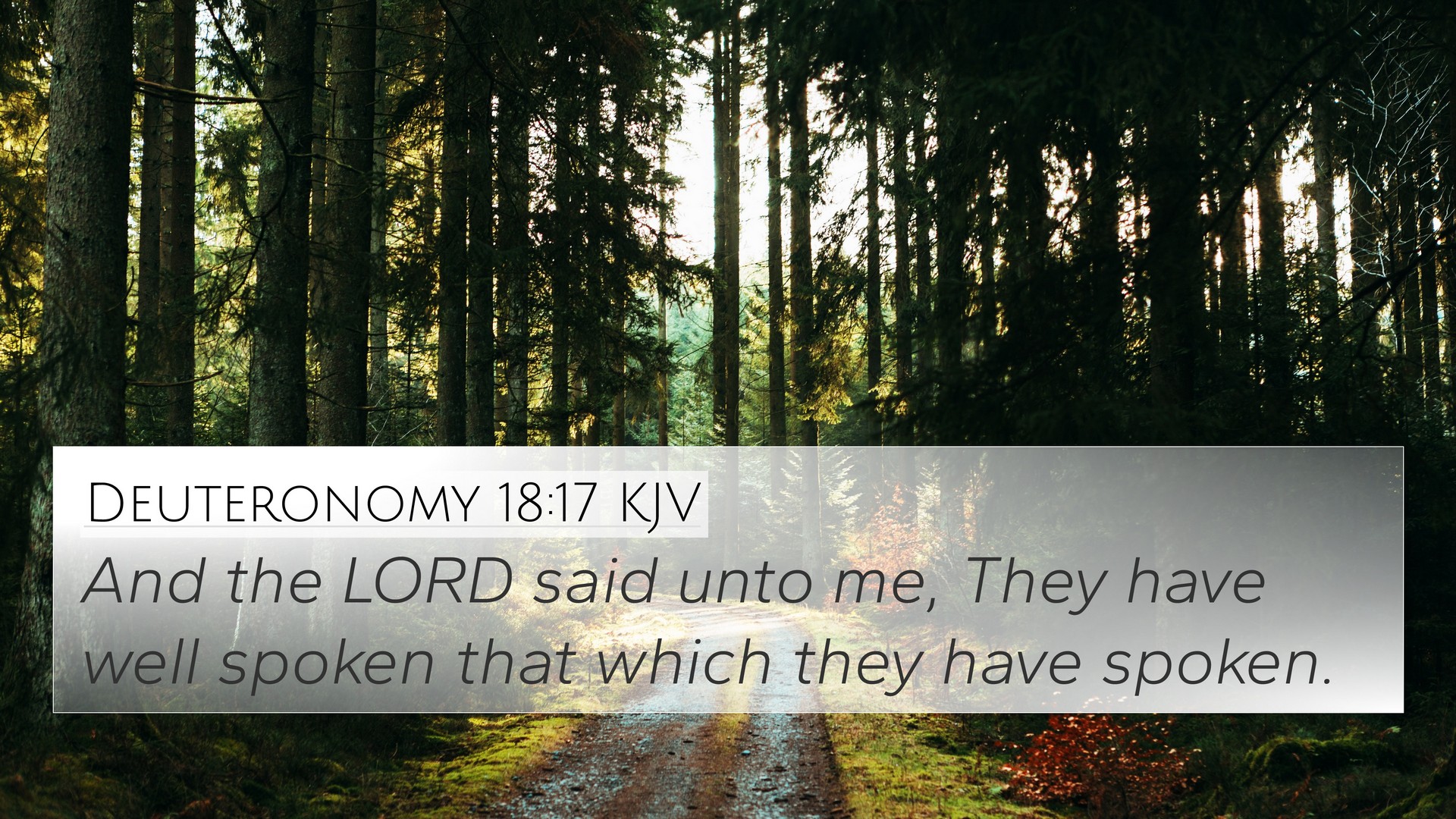Understanding Deuteronomy 18:17
Deuteronomy 18:17 states:
"And the LORD said unto me, They have well spoken that which they have spoken." (KJV)
This verse is part of a larger context where God assures Moses that He will raise up a prophet from among the Israelites. Understanding this scripture involves exploring its implications regarding prophecy, leadership, and divine guidance.
Commentary Insights
The following insights provide a comprehensive understanding of Deuteronomy 18:17, drawing from public domain commentaries:
- Matthew Henry:
Henry emphasizes the Israelites' request for a mediator based on their fear of God's voice after Mount Sinai, which indicates their recognition of God's holiness and their own sinfulness. This expression of need was approved by God, and the announcement of a coming prophet highlights God’s ongoing relationship with His people.
- Albert Barnes:
Barnes notes that the promise of raising a prophet signifies the continuation of God’s communication with Israel. This prophet would be like Moses in authority and would speak the commands of God, encouraging the people to obey. It underscores the importance of divine leadership and prophecies within the covenant community.
- Adam Clarke:
Clarke elaborates on the prophetic role, stressing that the Israelites, through their request, indirectly foreshadowed the Messiah. He interprets the phrase "They have well spoken" as God’s approval of their desire for guidance. This portrays God’s intention to provide for His people even amid their shortcomings.
Thematic Connections
This verse is interwoven with several key themes in Scripture:
- Divine Communication: The explicit manifestation of God’s will through prophets is crucial throughout both the Old and New Testaments.
- Leadership and Mediation: The anticipation of a prophet mirrors the need for mediation between God and humanity, which is resolved in Jesus Christ.
- Faith and Obedience: The call to adhere closely to the words of the prophet signifies an ongoing need for faithfulness among God’s people.
Cross References
Deuteronomy 18:17 relates to several other scripture passages, fostering an understanding of inter-Biblical dialogue. Here are some notable cross-references:
- Acts 3:22-23: Peter references this prophecy regarding Jesus as the fulfillment of God's promise of a prophet.
- John 6:14: The people recognized Jesus as the prophet who was to come, affirming the prophetic role outlined in Deuteronomy.
- Hebrews 1:1-2: This passage describes God’s communication through prophets in times past and culminates in the Son, aligning with the message of Deuteronomy.
- Matthew 17:5: The voice from the cloud refers to Jesus, indicating divine approval and emphasizing the continuation of prophetic fulfillment.
- 1 Samuel 3:19-21: God’s raising of Samuel reflects the establishment of prophetic voices to guide His people.
- Micah 3:8: The role of the prophet as a channel of God’s intentions for the nation of Israel.
- Jeremiah 1:5: The commissioning of Jeremiah acts as an example of God selecting individuals for prophetic roles.
Analyzing Connections Between Bible Verses
For anyone interested in understanding Bible verse connections, Deuteronomy 18:17 serves as a rich focal point. The examination of cross-references provides a vast network of related scriptures.
Tools for Cross-Referencing
To explore these connections further, resources like a Bible concordance or a cross-reference Bible study guide can be particularly helpful. These tools enable in-depth study tailored to specific themes or inquiries.
How to Use Bible Cross-References
- Identify keywords: Understanding the main concepts in a verse will guide you to related texts.
- Look for thematic links: Investigate how themes of leadership, prophecy, and divine revelation connect across various Scriptures.
- Cross-reference techniques: Utilize a comprehensive Bible cross-reference system to trace connections methodically.
Conclusion
Deuteronomy 18:17 is a pivotal verse highlighting God's intent to provide leadership through prophecy. Using the insights from commentaries along with Scripture cross-references enriches one's understanding of biblical themes and the continuity of God's plan for humanity through leadership, mediation, and divine guidance.
By delving into guided studies, individuals can enhance their Bible verse interpretation skills, paving the way for deeper spiritual insights.



